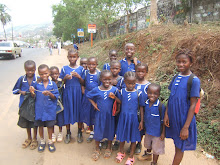+ I've written in the past about the lack of electricity here. This is a very complicated problem in Sierra Leone that is infuriating because the possibility for the public to actually receive electricity exists - the government simply won't give it to them. Over the Christmas holidays we have been lucky - the National Power Authority has been providing electricty almost every day for almost 20 hours a day for the past two weeks. When I say that we don't have electricity it's not because the power lines don't exist and it's not because the house is not equipped for it - the power just doesn't come. We have a generator that turns on every day at 7pm and lasts until the morning providing us with air-conditioning, lighting and hours of BBC World. But we pay for the fuel for the generator and we are responsible for turning it on. The public, the poor, the non-expats and the non-whites do not have these luxuries. They light their homes at night with bunsen burners and only the bars and restaurants and stores that have generators have any electricity. The roads have no traffic lights (none - not one single traffic light exists in the country) and the streets are lined at night by flickers of fire coming from the lanterns of tin-roofed, tiny, wooden shacks the size of my bathroom. But the fact remains that during the past two weeks we've been receiving electricity during the day. This is for three reasons:
+ It is Christmas. The President every year offers electricity as a sort of "Christmas present" to the public. It's Christmas, so we'll let the hospitals not-run on fuel-powered generators, we'll let the mothers turn on fans to cool their fevered, dying children, and we'll let the expats use the microwave to make some popcorn.
+ It is an election year. The elections will be taking place in February and it's very likely that this burst of electric activity will continue for a while as the Sierra Leone People's Party waits for the public to come to the polls cheering their thank-yous.
+ Sierra Leone is the second least-developped country on the planet. (Don't ask me who's in last place. That's where we'd been for the past ten years - we just got bumped up in the 2006 UN Report.) What is interesting to note is that during the war - which was a particularly brutal one - there was actually more electricity than there is now. Thirty years ago, there were traffic lights in every city from Freetown to Bo to Kenema. In the middle of Freetown at Congo Cross (a junction downtown) there was a large fountain bursting water and lights every single night, a little wannabe Paris. Ten years ago, the country was dealing with a bloodbath but people could at least go to a hospital run on electricty and not an auxiliary generator when they got their limbs cut off. Today the government is so incredibly corrupt that electricty is used as a very literal power source in every sense of the term. The lack of electricity, the water shortages and the incessant poverty keep Sierra Leone on the lowest rung of the developpment ladder which means that it receives significant funding from NGOs, foreign governments, the EU and private individuals. The UN High Commission for Refugees has plastered half the countryside with tents for the poor and dug wells for them to get water. The plethora of NGOs in Freetown, Bo and Kenema help the rich get richer since we buy so much beer and contract people for things like logistics support in our computer labs. Witholding electricty from the public keeps Sierra Leonians poor, and helps the members of Government, investors, and Lebanese restaurant-owners rich. The rich stay rich and the poor suffer and die off like flies.
As I write this, it is the Christmas season in an election year in the second-poorest country in the world, and my Dell laptop is plugged into the wall.
Wednesday, January 03, 2007
Subscribe to:
Post Comments (Atom)

No comments:
Post a Comment